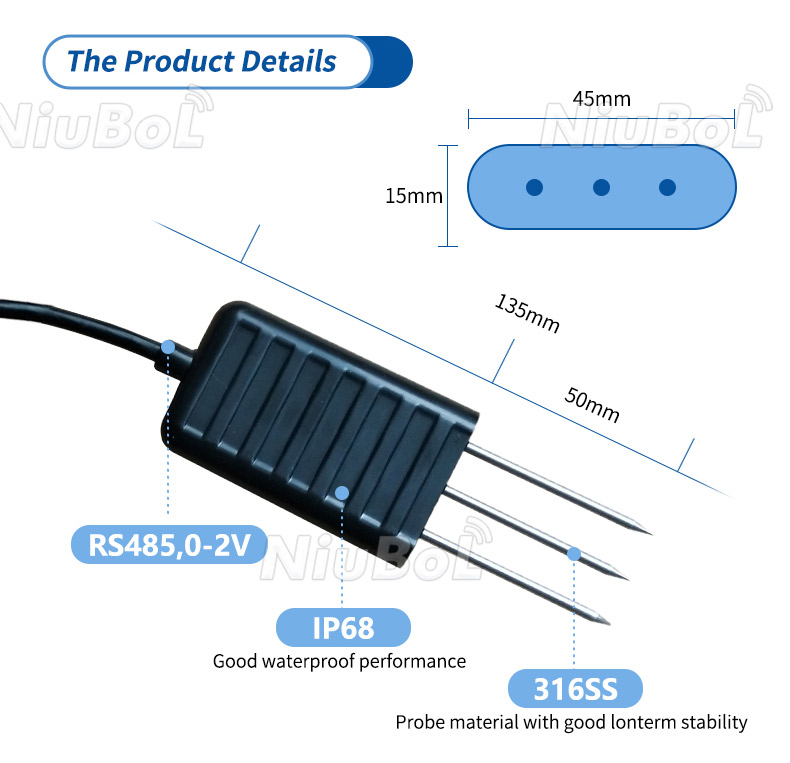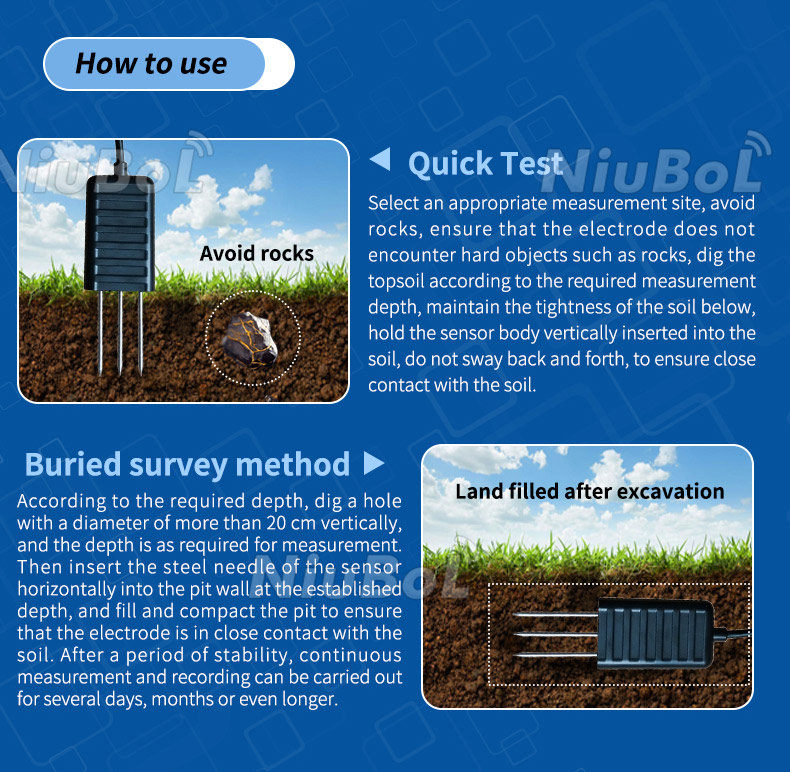

— Blogs —
—Products—
 Consumer hotline +8618073152920
Consumer hotline +8618073152920 WhatsApp:+8615367865107
Address:Room 102, District D, Houhu Industrial Park, Yuelu District, Changsha City, Hunan Province, China
Product knowledge
Time:2022-09-17 16:47:40 Popularity:576
Soil moisture conductivity temperature sensors Product Description.
The soil moisture/conductivity/temperature sensor is stable and sensitive and is an important tool for observing and studying the occurrence, evolution and improvement of saline soils as well as water and salt dynamics. By measuring the dielectric constant of the soil, it gives a direct and stable indication of the true moisture content of various soils. The soil moisture sensor measures soil moisture as a percentage by volume and is a soil moisture measurement method that meets current international standards. It is suitable for soil moisture monitoring, scientific experiments, water saving irrigation, greenhouses, flowers and vegetables, grassland pastures, rapid soil testing, plant culture, sewage treatment, fine agriculture, etc.
Soil moisture temperature conductivity sensors (3-in-1 soil sensors)Technical parameters.
| Soil temperature: | Range: -40~80°C; Resolution: 0.1°C; Accuracy: ±0.5°C |
| Soil moisture: | Range: 0-100%RH; Resolution: 0.1%RH; Precision: ± 5% |
| Soil conductivity: | Range: 0-10000us/cm;Resolution: 1us/cm within 0-10000us/cm;Accuracy: ±5% within the range of 0-10000us/cm |
| Conductivity temperature compensation | built-in temperature compensation sensor, compensation range 0-50 ℃ |
| Built-in temperature compensation sensor | compensation range 0-50 ℃ |
| Supply voltage: | DC5V-24V |
| Signal output: | RS485, Modbus protocol |
| Protection level: | IP68 can be used for a long time when submerged in water. |
| Operating environment: | -40~85°C |
| Probe material: | anti-corrosion special electrode |
| Sealing material: | black flame retardant epoxy resin |
| Installation method: | all buried or all probes inserted into the measured medium |
| Default cable length: | 5 meters, cable length can be customized according to requirements |
| Overall Dimension: | 45*15*135mm |

Soil moisture temperature conductivity sensors Functional features.
(1) Soil moisture content, electrical conductivity and temperature in one parameter.
(2) It can also be used for the conductivity of water and fertiliser solutions, and other nutrient solutions and substrates.
(3) The electrode is made of specially treated alloy material, which can withstand strong external impact and is not easily damaged.
(4) Completely sealed, acid and alkali resistant, can be buried in the soil or directly into the water for long-term dynamic testing.
(5) High accuracy, fast response, good interchangeability, probe insertion design ensures accurate measurement and reliable performance.
Soil temperature and moisture conductivity sensors (often called TDR sensors, Time Domain Reflectometer sensors) have an important role and significant value in the fields of agriculture, environmental sciences, ecology and civil engineering. These sensors not only measure the temperature and humidity of the soil, but also determine the electrical conductivity of the soil, three parameters that are critical to understanding and managing soil conditions.
- Temperature: Soil temperature affects plant root activity and microbial activity and has a direct impact on crop growth and nutrient cycling.
- Moisture: Accurate measurement of soil moisture content can help optimize irrigation strategies to ensure that plants receive the right amount of water while avoiding wasted water.
- Electrical Conductivity: Soil Electrical Conductivity (EC) reflects the concentration of salts in the soil solution and can indicate the state of soil fertility, the presence of salinity problems, and suitability for specific crops.
- By providing real-time data, it helps farmers and horticulturists to develop more accurate irrigation and fertilization schedules, increasing agricultural productivity and reducing unnecessary inputs.
- For areas where water is scarce, the sensor can support the application of water-saving irrigation techniques and promote sustainable agriculture.
- Monitor soil changes to detect possible signs of pollution or degradation, such as salinization due to excessive use of chemical fertilizers, so that preventive measures can be taken to protect soil health.
- Support ecological restoration projects to ensure appropriate soil conditions during revegetation.
- Provide reliable data for scientific research, e.g. to study the effects of climate change on soil properties and to explore soil behavior under different farming practices.
- In the field of education, it is used as a teaching tool for students to understand the physical properties of soils and their importance to the ecosystem.

- Improve crop yield and quality, reduce production costs and increase farmers' income.
- Optimize the allocation of resources, reduce the economic losses caused by excessive irrigation or fertilization.
- Ensure food safety and produce healthier and safer food through improved soil management and planting practices.
- Enhance public awareness of environmental protection and promote green lifestyles.
- Protect natural resources, prevent soil erosion, salinization and other problems, and maintain ecological balance.
- Reduce agricultural surface pollution and protect groundwater and surface water bodies from pollution.
- Promote the development of smart agriculture, combining new technologies such as the Internet of Things (IoT) and big data analysis to realize automation and intelligence in agricultural production.
- Promote interdisciplinary cooperation, integrating knowledge and technology from many fields, such as agriculture, environmental science, and information technology, to jointly solve complex agricultural and environmental problems.
In summary, soil temperature and moisture conductivity sensors not only play a key role in agricultural production, but also show great potential and value in environmental protection, scientific research and social development.
NBL-S-TMC-Soil-temperature-and-moisture-conductivity-sensor.pdf
Prev:Soil moisture monitoring system can realize long-term continuous monitoring of soil moisture
Next:Influence of weather station and solar radiation monitoring on photovoltaic power station
Related recommendations
Sensors & Weather Stations Catalog
Agriculture Sensors and Weather Stations Catalog-NiuBoL.pdf
Weather Stations Catalog-NiuBoL.pdf
Related products
 Combined air temperature and relative humidity sensor
Combined air temperature and relative humidity sensor Soil Moisture Temperature sensor for irrigation
Soil Moisture Temperature sensor for irrigation Soil pH sensor RS485 soil Testing instrument soil ph meter for agriculture
Soil pH sensor RS485 soil Testing instrument soil ph meter for agriculture Wind Speed sensor Output Modbus/RS485/Analog/0-5V/4-20mA
Wind Speed sensor Output Modbus/RS485/Analog/0-5V/4-20mA Tipping bucket rain gauge for weather monitoring auto rainfall sensor RS485/Outdoor/stainless steel
Tipping bucket rain gauge for weather monitoring auto rainfall sensor RS485/Outdoor/stainless steel Pyranometer Solar Radiation Sensor 4-20mA/RS485
Pyranometer Solar Radiation Sensor 4-20mA/RS485
Screenshot, WhatsApp to identify the QR code
WhatsApp number:+8615367865107
(Click on WhatsApp to copy and add friends)